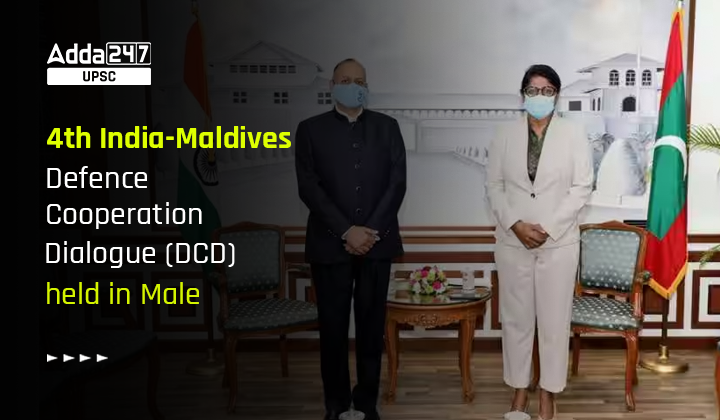Table of Contents
4th India-Maldives Defence Cooperation Dialogue (DCD): It is an annual event organized by India and Maldives to strengthen defence relations b/w two countries. India-Maldives Defence Cooperation Dialogue (DCD) is also important for UPSC Prelims Exam 2023 and UPSC Mains Exam (GS Paper 2- International Relations- Bilateral Relations b/w India and Maldives; GS Paper 3- Internal Security).
4th India-Maldives Defence Cooperation Dialogue (DCD) in News
Recently, The 4th Defence Cooperation Dialogue (DCD) between India and the Maldives was conducted in Male, Maldives. 4th India-Maldives Defence Cooperation Dialogue (DCD) was organized with Defence Secretary Shri Giridhar Aramane and Chief of Defence Force, Maldives National Defence Forces Major General Abdulla Shamaal serving as co-chairs.
4th India-Maldives Defence Cooperation Dialogue (DCD)
The 4th Defence Cooperation Dialogue (DCD) between India and Maldives holds great importance as the primary institutionalized interactive mechanism for shaping the future of their Armed Forces’ relations.
- During this dialogue, both nations reviewed their ongoing bilateral defense cooperation activities and expressed contentment with the increasing level of engagements.
- They also discussed their current bilateral exercises and agreed to make them more complex.
- The constant efforts made by the Armed Forces of India and the Maldives to expand their bilateral cooperation across multiple fields indicate a promising future for their relations.
India-Japan Defence Cooperation
India and the Maldives have been cooperating in the areas of defence and security since 1988, which includes providing defence training and equipment to the Maldives.
- India offers the highest number of training opportunities to the Maldivian National Defence Force (MNDF), fulfilling approximately 70% of their defence training requirements.
- In 2016, the two nations signed a comprehensive action plan to reinforce their defence partnerships.
- The Defence Cooperation Dialogue is one of India’s frameworks at a policy level to strengthen their longstanding and mutually beneficial bilateral defence ties.
- The first DCD was held in 2016, while the second one took place in 2019. The third India-Maldives Defence Cooperation Dialogue (DCD) was held in 2021.
4th India-Maldives Defence Cooperation Dialogue (DCD) FAQs
Q: What is the India-Maldives Defence Cooperation Dialogue (DCD)?
A: The India-Maldives Defence Cooperation Dialogue (DCD) is the highest institutionalized interactive mechanism between the two nations, focusing on shaping the future of their Armed Forces’ relations.
Q: Who chaired the 4th India-Maldives Defence Cooperation Dialogue?
A: The 4th India-Maldives Defence Cooperation Dialogue was co-chaired by Defence Secretary Shri Giridhar Aramane and his Maldivian counterpart, Chief of Defence Force, Maldives National Defence Forces Major General Abdulla Shamaal.
Q: What did the 4th India-Maldives Defence Cooperation Dialogue cover?
A: During the 4th India-Maldives Defence Cooperation Dialogue, both sides reviewed their ongoing bilateral defense cooperation activities, discussed the current bilateral exercises, and expressed satisfaction with the increasing level of engagements. They also agreed to enhance the complexity of their bilateral exercises and emphasized the continual efforts made to expand their bilateral cooperation across multiple fields.
Q: When did India and the Maldives begin cooperating in defence and security?
A: India and the Maldives started cooperating in the areas of defence and security since 1988.
Q: What is the significance of the Defence Cooperation Dialogue between India and the Maldives?
A: The Defence Cooperation Dialogue between India and the Maldives is a policy-level framework that aims to strengthen their longstanding and mutually beneficial bilateral defence ties. It plays a crucial role in shaping the future of their Armed Forces’ relations.
India-Maldives Bilateral Relations, The Hindu Editorial Analysis
India-Maldives Bilateral Relations, The Hindu Editorial Analysis



 TSPSC Group 1 Question Paper 2024, Downl...
TSPSC Group 1 Question Paper 2024, Downl...
 TSPSC Group 1 Answer key 2024 Out, Downl...
TSPSC Group 1 Answer key 2024 Out, Downl...
 UPSC Prelims 2024 Question Paper, Downlo...
UPSC Prelims 2024 Question Paper, Downlo...
